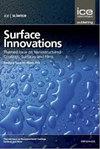利用柏科豆荚中的生物活性剂绿色制备抗菌棉织物
IF 3.5
4区 材料科学
Q3 CHEMISTRY, PHYSICAL
引用次数: 2
摘要
抗菌织物在组织和管理虫害以及减少微生物形成的气味方面变得至关重要。各种绿色来源为织物增加了抗菌性能,尤其是棉花。然而,微生物织物的主要问题是每次洗涤后抗菌活性降低。柏科植物的豆荚在草药中显示出天然的抗菌潜力。本研究利用柏科植物在棉织物中加入抗菌性能。用甲醇提取柏科提取物后,将其应用于棉织物中。通过优化浓度、温度和pH等参数,对提取液在棉织物上的应用进行了研究。提取物改性的棉花在15 重量百分比浓度、140°C和pH 7.5。使用标准洗涤方法ISO 105-C10:2006在粘合剂存在和不存在的情况下测试处理过的织物。经媒染剂处理的织物在洗涤20次后仍保持16.4%以上的活性。最后,采用AATCC 100-2004测试方法,对绿色抗菌棉织物的抗葡萄球菌、大肠杆菌、芽孢杆菌和白色念珠菌活性进行了检测。研究表明,除白色念珠菌外,所制备的棉织物对上述菌株均表现出较好的抗菌活性。所制备的抗菌织物显示出广泛的抗菌活性和较低的真菌活性。因此,制备的织物可用于伤口敷料、医院工作人员长袍材料和运动员运动服,以防止微生物感染。本文章由计算机程序翻译,如有差异,请以英文原文为准。
Greenly prepared antimicrobial cotton fabrics using bioactive agents from Cupressaceae pods
Antimicrobial fabrics have become essential in organizing and managing infestation and reducing odor formation by microbes. Various green sources add antimicrobial properties to fabrics, particularly cotton. However, the major problem with microbial fabrics is the reduction in antimicrobial activity after each wash. Cupressaceae pods have shown natural potential as an antimicrobial agent in herbal medicine. This study utilizes Cupressaceae for incorporating antimicrobial properties in cotton fabrics. After methanolic extraction of the Cupressaceae extract, it was applied to cotton fabrics. The application of the extract to cotton fabrics was performed by optimizing concentration, temperature and pH parameters. The extract-modified cotton showed the best performance at a 15 wt.% concentration, 140°C and pH 7.5. The treated fabrics were tested in the presence and absence of a binder using the standard washing method ISO 105-C10:2006. The mordant-treated fabric retained 16.4% more activity after 20 washes. Finally, the antimicrobial activity of the greenly developed antimicrobial cotton fabrics was checked against Staphylococcus, Escherichia coli, Bacillus and Candida albicans by using the AATCC 100-2004 test method. The study indicated that the prepared cotton fabric showed better antimicrobial activity against the earlier mentioned strains, except for C. albicans. The prepared antimicrobial fabric showed a wide range of antimicrobial activities and a lower fungal activity. Thus, the prepared fabric can be used for wound dressings, hospital staff gown material and athlete’s sportswear to prevent microbial infection.
求助全文
通过发布文献求助,成功后即可免费获取论文全文。
去求助
来源期刊

Surface Innovations
CHEMISTRY, PHYSICALMATERIALS SCIENCE, COAT-MATERIALS SCIENCE, COATINGS & FILMS
CiteScore
5.80
自引率
22.90%
发文量
66
期刊介绍:
The material innovations on surfaces, combined with understanding and manipulation of physics and chemistry of functional surfaces and coatings, have exploded in the past decade at an incredibly rapid pace.
Superhydrophobicity, superhydrophlicity, self-cleaning, self-healing, anti-fouling, anti-bacterial, etc., have become important fundamental topics of surface science research community driven by curiosity of physics, chemistry, and biology of interaction phenomenon at surfaces and their enormous potential in practical applications. Materials having controlled-functionality surfaces and coatings are important to the manufacturing of new products for environmental control, liquid manipulation, nanotechnological advances, biomedical engineering, pharmacy, biotechnology, and many others, and are part of the most promising technological innovations of the twenty-first century.
 求助内容:
求助内容: 应助结果提醒方式:
应助结果提醒方式:


